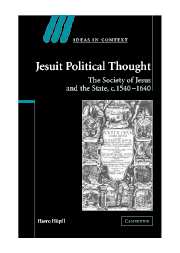Book contents
- Front Matter
- Contents
- Acknowledgements
- List of abbreviations
- Translations, references, and orthography
- Introduction
- 1 The character of the Society of Jesus
- 2 The Society's organisational ideas
- 3 The Society and political matters
- 4 The Church, the Society, and heresy
- 5 The confrontation with reason of state
- 6 Reason of state and religious uniformity
- 7 Jesuit reason of state and fides
- 8 Reason of state, prudence, and the academic curriculum
- 9 The theory of political authority
- 10 Limited government, compacts, and states of nature
- 11 The theory of law
- 12 The common good and individual rights
- 13 Tyrannicide, the Oath of Allegiance controversy, and the assassination of Henri IV
- 14 The papal potestas indirecta
- Conclusion
- Bibliography
- Index
- IDEAS IN CONTEXT
Translations, references, and orthography
Published online by Cambridge University Press: 22 September 2009
- Front Matter
- Contents
- Acknowledgements
- List of abbreviations
- Translations, references, and orthography
- Introduction
- 1 The character of the Society of Jesus
- 2 The Society's organisational ideas
- 3 The Society and political matters
- 4 The Church, the Society, and heresy
- 5 The confrontation with reason of state
- 6 Reason of state and religious uniformity
- 7 Jesuit reason of state and fides
- 8 Reason of state, prudence, and the academic curriculum
- 9 The theory of political authority
- 10 Limited government, compacts, and states of nature
- 11 The theory of law
- 12 The common good and individual rights
- 13 Tyrannicide, the Oath of Allegiance controversy, and the assassination of Henri IV
- 14 The papal potestas indirecta
- Conclusion
- Bibliography
- Index
- IDEAS IN CONTEXT
Summary
Except where indicated, all translations are my own, but where there are modern translations, I have acknowledged my debts. Where a work cited was translated more or less contemporaneously into some vernacular, I have usually used the English translation where one existed, or compared the Latin to the other vernacular renditions. The latter were not invariably punctilious in point of accuracy, but then bilingual authors at the time(e.g. Calvin or Hobbes) took considerable liberties with their own texts, and in any event such versions are more of a pleasure to read than modern translations. I have left orthography as I found it, interpolating clarifications in square brackets where it seemed unavoidable. The riotous German and English (and a fortiori Scottish) spellings of the sixteenth century have therefore been reproduced unaltered, although I cannot guarantee letter by letter fidelity. My italicisation is scrupulously faithful to the sources except where indicated. As for punctuation, its rules were not settled either in Latin or in the vernaculars, but from the standpoint of modern taste and practice people tended to over-punctuate, especially in the sometimes sense-obscuring use of the comma. My punctuation is not always faithful to the originals, since I see no point in putting gratuitous obstacles in the reader's way.
The spelling of surnames is of some importance, because of the difficulty of tracing references.
- Type
- Chapter
- Information
- Jesuit Political ThoughtThe Society of Jesus and the State, c.1540–1630, pp. xi - xiiPublisher: Cambridge University PressPrint publication year: 2004



